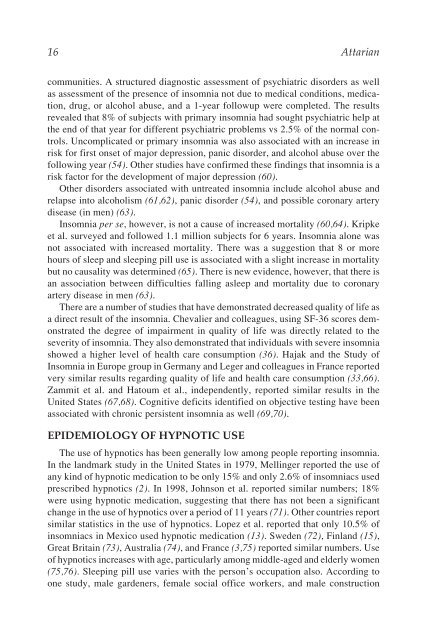Insomnia Insomnia
Insomnia Insomnia
Insomnia Insomnia
You also want an ePaper? Increase the reach of your titles
YUMPU automatically turns print PDFs into web optimized ePapers that Google loves.
16 Attarian<br />
communities. A structured diagnostic assessment of psychiatric disorders as well<br />
as assessment of the presence of insomnia not due to medical conditions, medication,<br />
drug, or alcohol abuse, and a 1-year followup were completed. The results<br />
revealed that 8% of subjects with primary insomnia had sought psychiatric help at<br />
the end of that year for different psychiatric problems vs 2.5% of the normal controls.<br />
Uncomplicated or primary insomnia was also associated with an increase in<br />
risk for first onset of major depression, panic disorder, and alcohol abuse over the<br />
following year (54). Other studies have confirmed these findings that insomnia is a<br />
risk factor for the development of major depression (60).<br />
Other disorders associated with untreated insomnia include alcohol abuse and<br />
relapse into alcoholism (61,62), panic disorder (54), and possible coronary artery<br />
disease (in men) (63).<br />
<strong>Insomnia</strong> per se, however, is not a cause of increased mortality (60,64). Kripke<br />
et al. surveyed and followed 1.1 million subjects for 6 years. <strong>Insomnia</strong> alone was<br />
not associated with increased mortality. There was a suggestion that 8 or more<br />
hours of sleep and sleeping pill use is associated with a slight increase in mortality<br />
but no causality was determined (65). There is new evidence, however, that there is<br />
an association between difficulties falling asleep and mortality due to coronary<br />
artery disease in men (63).<br />
There are a number of studies that have demonstrated decreased quality of life as<br />
a direct result of the insomnia. Chevalier and colleagues, using SF-36 scores demonstrated<br />
the degree of impairment in quality of life was directly related to the<br />
severity of insomnia. They also demonstrated that individuals with severe insomnia<br />
showed a higher level of health care consumption (36). Hajak and the Study of<br />
<strong>Insomnia</strong> in Europe group in Germany and Leger and colleagues in France reported<br />
very similar results regarding quality of life and health care consumption (33,66).<br />
Zammit et al. and Hatoum et al., independently, reported similar results in the<br />
United States (67,68). Cognitive deficits identified on objective testing have been<br />
associated with chronic persistent insomnia as well (69,70).<br />
EPIDEMIOLOGY OF HYPNOTIC USE<br />
The use of hypnotics has been generally low among people reporting insomnia.<br />
In the landmark study in the United States in 1979, Mellinger reported the use of<br />
any kind of hypnotic medication to be only 15% and only 2.6% of insomniacs used<br />
prescribed hypnotics (2). In 1998, Johnson et al. reported similar numbers; 18%<br />
were using hypnotic medication, suggesting that there has not been a significant<br />
change in the use of hypnotics over a period of 11 years (71). Other countries report<br />
similar statistics in the use of hypnotics. Lopez et al. reported that only 10.5% of<br />
insomniacs in Mexico used hypnotic medication (13). Sweden (72), Finland (15),<br />
Great Britain (73), Australia (74), and France (3,75) reported similar numbers. Use<br />
of hypnotics increases with age, particularly among middle-aged and elderly women<br />
(75,76). Sleeping pill use varies with the person’s occupation also. According to<br />
one study, male gardeners, female social office workers, and male construction


